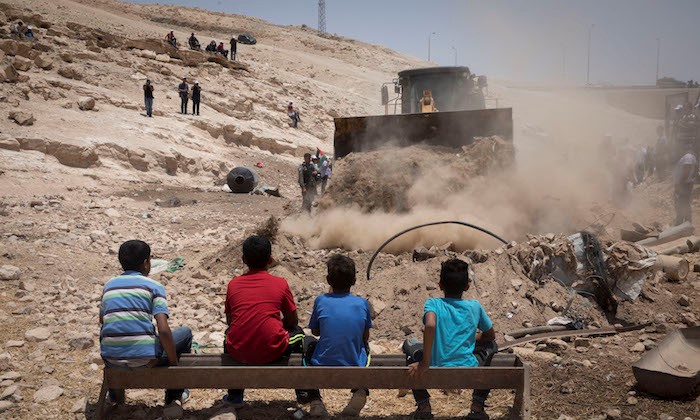Despite the change of administration in the United States, Israel’s settlement building policies in the occupied Palestinian territories will remain largely unchanged, an Israeli government official has told The Times of Israel.
The official said that Prime Minister Naftali Bennett’s new government will operate based on the understandings his predecessor Benjamin Netanyahu reached with former president Donald Trump, whose administration allowed Israel to continue building in settlements across the West Bank, so long as the construction did not expand beyond communities’ “existing footprints.”

Children from the Palestinian Bedouin village of Khan al-Ahmar look on as a bulldozer makes preparations for an access road to be used by Israeli forces in the “imminent evacuation and demolition” of the West Bank hamlet, July 4, 2018. (Photo: Activestills)
This agreement allowed settlement building to skyrocket during the Trump era more than doubling its volume compared to former president Barack Obama’s second term. The official said that Bennett is aware of the issue’s sensitivity and acted to delay the convening of the Defense Ministry body that approves settlement construction in order for it not to coincide with his visit to Washington last week.
Fearing ICC, Gov’t Asks for 6 Month Delay vis. Khan al-Ahmar
Israeli government officials asked the High Court of Justice (HJC) on Sunday, September 5, for a six-month extension of the deadline for presenting its position on the evacuation of the Palestinian Bedouin residents of the village of Khan al-Ahmar in the occupied West Bank.
In an unusual step, the government’s request for an extension was first announced by the Foreign Ministry, not typically the address for issues involving Israeli demolition of Palestinian buildings and communities in the West Bank. The court had demanded that the state defend its failure to remove the Bedouin encampment perched near Route 1, close to the settlement of Kfar Adumin, ordering it do so by September 5.
According to the Arabic-language communist newspaper Al-Ittihad, Israel is under international and local pressure not to pursue its policy of demolishing Palestinian homes and other structures. The international community and the Palestinian Authority have argued that Khan al-Ahmar residents have a right to remain at the site, where they first settled in the 1950s. The residents who originally lived in the Negev in Israel were expelled by the latter to the West Bank, then under Jordanian rule, in the 1950s. For decades they have been living in shacks and tents that also shelter their sheep and goats.
Former prime minister Benjamin Netanyahu had appeared poised in 2018 to demolish the village of Khan al-Ahmar, which is home to some 180 Arab-Palestinian Jahalin Bedouin. However, Netanyahu backed away from the demolition apparently after former International Criminal Court (ICC) chief prosecutor Fatou Bensouda warned that such activity could constitute a war crime. The ICC is examining the possibility of allowing war crimes suits to be filed against Israelis.
Prime Minister Naftali Bennett and his Yamina Party have in the past supported the demolition of Khan al-Ahmar. Bennett and Interior Minister Ayelet Shaked opposed the cabinet’s decision in 2018 to postpone the eviction of the village’s residents. Current Justice Minister Gideon Sa’ar (New Hope) went as far as to kick off his own election campaign for the Likud chairmanship there in 2019, under the banner of its evacuation and demolition. Finance Minister Avigdor Lieberman, a settler from Nokdim, has also visited the village and called for its depopulation and demolition.
Related:


